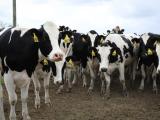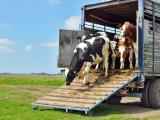Aug 7, 2012
3-month probe finds no other sign of BSE in California cow case
A 3-month investigation of the most recent US case of bovine spongiform encephalopathy (BSE), or mad cow disease, showed no other disease in at-risk cows and no problems with feed suppliers, the US Department of Agriculture (USDA) said in a report released last week. The case, which involved a 10-year-old Holstein from a central California dairy and was announced Apr 24, was the first in the country since 2006 and the fourth overall. After an extensive probe into cattle and feed that included the US Food and Drug Administration (FDA) and the California Department of Food and Agriculture (CDFA), officials concluded, "At no time was the US food supply or human health at risk, and the United States' longstanding system of interlocking safeguards against BSE continues to be effective," according to a news release from the USDA Animal and Plant Health Inspection Service (APHIS). Inspectors detected no BSE in about 90 other carcasses held at the same rendering station as the index cow, and its two offspring were also cleared, the report said. Investigators also found that 11 feed suppliers were "in compliance with FDA and CDFA regulations and requirements." The APHIS release underscored the three safeguards in place to keep BSE out of the US food supply: (1) removing targeted animal tissue, (2) a ban on using animal tissue in cattle feed, and (3) ongoing BSE surveillance, as evidenced by this case.
Aug 3 USDA report
Aug 3 APHIS press release
Apr 24 CIDRAP News story on BSE case
Two pharmacy chains begin offering vaccine for new flu season
Two pharmacy chains—RiteAid and Walgreens—yesterday announced that flu shots for the upcoming season are now available in their stores. The development follows recent announcements that four of five vaccine makers had begun shipping their first doses for the US market. Companies have said they expect to produce up to 149 million doses of flu vaccine for the 2012-13 flu season. RiteAid said in its press release that customers can receive flu vaccine at any of its 4,600 stores during pharmacy hours without an appointment. Walgreens said that the vaccine is available at its nearly 8,000 stores, including Duane Reade pharmacies in New York, as well as at more than 360 Take Care Clinics at select Walgreens stores. Robert Thompson, RiteAid's executive vice president of pharmacy, said in the statement that although it's hard to predict how any flu season will unfold, getting immunized as soon as the vaccine is available is the best protection strategy.
Aug 6 RiteAid press release
Aug 6 Walgreens press release
Study: Sandy rice-field soil in Cambodia may inhibit H5N1 spread
Certain soil types contaminated with H5N1 avian flu viruses led to chicken deaths when added to their houses, but sandy topsoil collected from area rice fields seemed to resist that pathogen, a Cambodian study in Emerging Infectious Diseases yesterday revealed. Investigators studied sandy topsoil collected from around rice fields in Phnom Penh province, as well as building sand and soil-based compost from a local tree nursery. They contaminated each soil type with low doses of H5N1 (1 infectious unit on day 0, 2 on day 6, 4 on day 12, and 8 on day 18) and high doses (8, 12, 16, and 20 infectious units on the various days, respectively). The soil was then sprinkled on the bottom of an isolator containing 10 to 20 chickens. High-dose building sand and compost both led to a 100% fatality rate after 2 days, whereas high-dose sandy topsoil led to no deaths. Low-dose compost led to a 50% H5N1 seroconversion rate after 24 days, compared with 33% for building sand and 1% for sandy soil. The authors hypothesize that the sandy soil's acidity inhibits H5N1 spread. They state that about 40% of rice fields in the country have this type of soil and that it is most commonly found in H5N1 outbreak areas. In contrast, "Soil-based compost and building sand, although existing in natural settings, are not the most common substrates found in places where free-ranging poultry are raised in Cambodia," they write.
Aug 6 Emerg Infect Dis letter




















